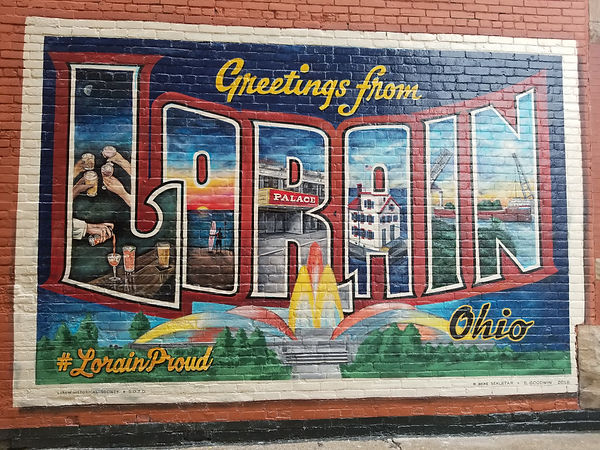PANEL 2
GROWING UP IN LORAIN

Lorain is a city known for its diversity, grit, and determination. Thousands of hardworking people have carved out their lives in Lorain, all the while living alongside people who spoke different languages, celebrated different cultures, practiced different religions, and came from different countries. This common lived experience shaped their worldview when they left the familiarity of Lorain to join the service.

Antonio Baez (U.S. Marines and U.S. Army Guard/Reserves, serving 2004-present): “Growing up here was pretty interesting. You have this melting pot, you know, what they call the International City. But it also had its mixtures of dangers and extracurricular activities that can get you into trouble. So, growing up, my brothers and I, we all experienced and followed some of those dangerous paths... My parents started having financial issues. And we went through a spell – on welfare and things like that.”
Describing the apartment house that he grew up in, Victor Ceja (U.S. Marine Corps, served 1953-1958) said, "And everybody in that neighborhood rented. Nobody owned anything. They were lucky if they had a car. Anyway, the building I was in - there were Spaniards, Greeks, Polish... and one guy was Mexican (his wife was African American), Italians, Hungarians, Slovaks - all in one building. Nobody had any problems. Everybody got along. We made tortillas. They make good bread and just passing it around."
Vic Ortiz (U.S. Navy, served 1990-1995), “So I grew up in Lorain, it's a very diverse city. It was back then. When I lived in Metropolitan housing, when I was young, there were a lot of Hispanics, there were a lot of African American families, there were a lot of... Man, we had a big Hungarian population close by where I live. I mean, you saw everybody, you saw people from all over. I thought that was kind of like the norm. You go to the military, and you can magnify that. ...When I was back home, I don't know if it was because I was young, if there was racism, I didn't see it. But in the military, I saw it, I felt it. So when I got out of the military and I got into law enforcement, it didn't escape me, the fact that certain people get treated a certain way by police officers...”
Commenting on where he got his work ethic, Hugo Tenorio (U.S. Army, served 1954-1956) explained "...After my parents came to Lorain from Detroit... I grew up in the grocery store business with them. And I remember working on 28th and Pearl Avenue, on Vine Avenue – two stores on Vine Avenue, one on Globe Avenue then. So [that's] my experience as far as work ethic." - Hugo Tenorio


Eduardo (Edwin) Santos Pacheco (U.S. Coast Guard, served 1972 – 1991) was raised by a single mother who brought him here from Puerto Rico once she had work established in the 1960s. He explained, “My role model was one of our neighbors. He worked at the Ford Company or the Steel industry like a lot of other parents. He introduced me to the church [where I] finally got to make my first comunión, and [he helped] me with my language barrier and school assignments. I learned that people needed to be treated with respect – that we are all one family.”
*No audio available*

